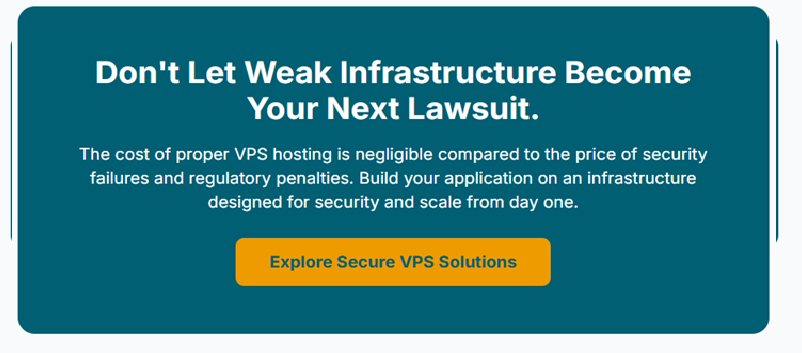
Cash App Lawsuit: The $202.5M Infrastructure Lesson Every Developer Should Learn
When a $44 billion company loses $202.5 million over bad data handling and weak infrastructure, it’s not just news but it’s a wake-up call for every CTO, developer, and founder out there.
The Cash App lawsuit isn’t only about users getting refunds. It’s a story about how small security decisions can destroy user trust, damage reputation, and cost millions.
The Cash App lawsuit might seem like another corporate legal headline, but under the surface, it’s a warning for every CTO, developer, and founder building digital products. The issue wasn’t just about money it was about data handling, user trust, and infrastructure decisions that scale faster than they secure.
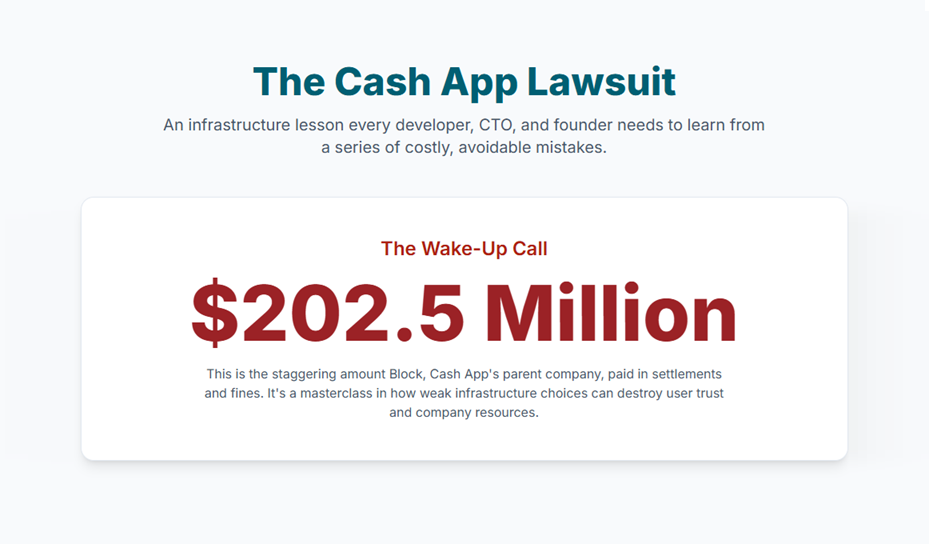
The $202.5 Million Wake-Up Call That Should Terrify Every Tech Leader
Cash App’s parent company Block has paid a staggering $202.5 million across multiple settlements and fines in 2024 to 2025. This isn’t just another “cost of doing business” story and it’s a masterclass in how weak infrastructure choices can destroy user trust and drain company resources.( Source )
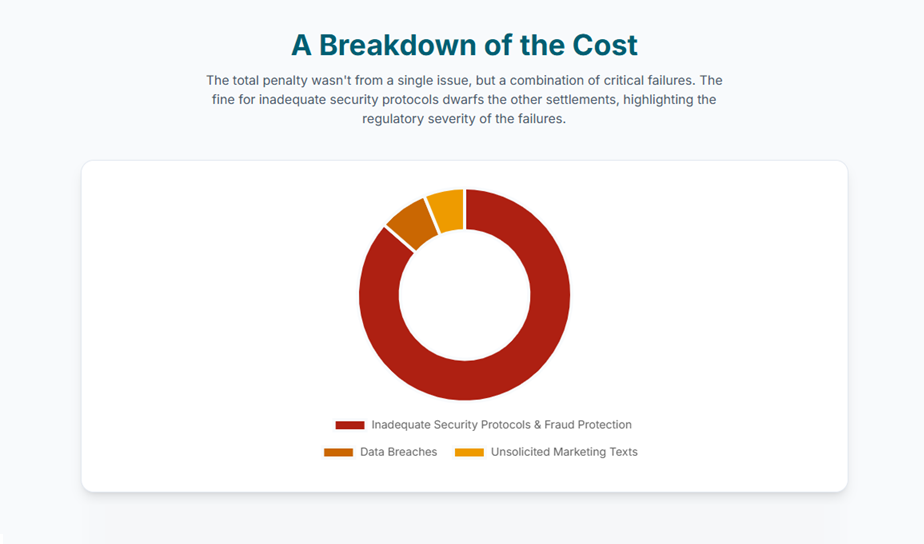
The breakdown tells a sobering story:
- $15 million settlement for data breaches affecting 8.2 million users.
( Source ) - $12.5 million settlement for unsolicited marketing texts sent to nearly 2 million phone numbers.
( Source ) - $175 million CFPB fine for inadequate security protocols and fraud protection failures.
( Source )
💸 Data Breach (8.2M users) ………… $15M
📱 Spam Text Violations …………….. $12.5M
Security & Fraud Failures (CFPB Fine) $175M
———————————————
Total ……………………………. $202.5M
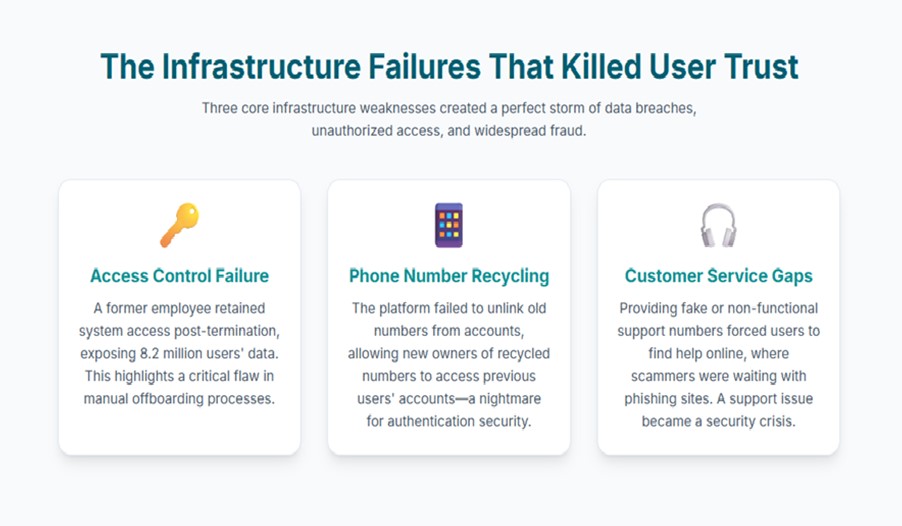
The Infrastructure Failures That Killed User Trust
Access Control: The $15 Million Mistake
The most damaging breach occurred when a former Cash App employee retained system access after termination. This single oversight exposed 8.2 million users’ personal and financial data. The employee downloaded sensitive customer reports containing full names, brokerage account numbers, portfolio values, and trading activity.
For developers, this represents a critical infrastructure lesson: employee offboarding processes must be automated and immediate. Manual access revocation creates windows of vulnerability that can cost millions.
Phone Number Recycling: A Developer’s Nightmare
Cash App’s 2023 breach exploited a fundamental flaw in their authentication system. When users changed phone numbers, the platform failed to properly unlink old numbers from accounts. New users receiving recycled numbers could access previous owners’ accounts simply by requesting login codes.
( Source )
This vulnerability highlights why multi and factor authentication and proper session management are non-negotiable for any payment platform. The infrastructure must assume phone numbers are temporary identifiers, not permanent security anchors.
The Customer Service Infrastructure That Enabled Fraud
The CFPB found that Cash App deliberately provided fake customer service numbers. For years, the phone number printed on Cash Cards and listed in terms of service connected to pre-recorded messages directing users to in app support. This forced users to search online, where scammers created fake support sites to harvest login credentials.
Block knew customers were being victimized by these fake support sites but failed to take timely action. The infrastructure choice to avoid human customer service became a security liability that enabled systematic fraud.
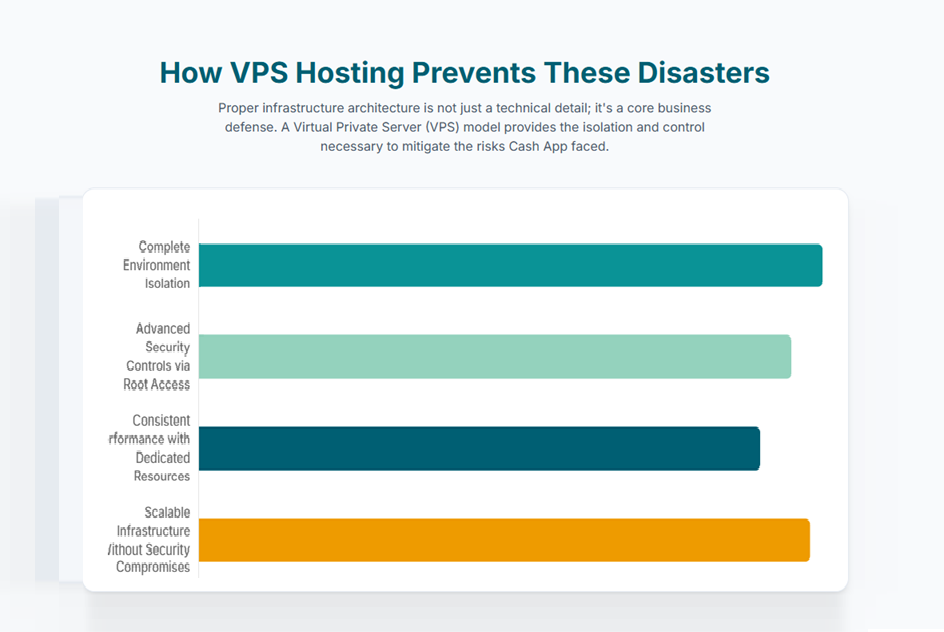
Why VPS Hosting Could Have Prevented These Disasters
The Cash App failures demonstrate why infrastructure isolation and control are essential for financial applications. Here’s how proper VPS hosting architecture addresses each vulnerability:
Complete Environment Isolation Stops Cross-Contamination
Unlike shared hosting environments where security breaches can affect multiple applications, VPS hosting provides complete virtual isolation. Each application runs in its own protected environment with dedicated resources. If one application faces a security incident, it cannot spread to others on the same physical server.
For payment platforms handling sensitive financial data, this isolation is critical. Cash App’s vulnerabilities might have been contained rather than cascading across their entire user base if proper infrastructure isolation had been implemented.
Root Access Enables Advanced Security Controls
VPS hosting provides full root access for implementing custom security measures. This includes:
- Custom firewall configurations tailored to specific application needs
- Advanced access control systems with automated employee offboarding
- Real-time monitoring and intrusion detection systems
- Encrypted data storage and transmission protocols
The former employee access issue at Cash App could have been prevented with automated provisioning and deprovisioning systems that VPS environments enable.
Dedicated Resources Ensure Consistent Security Performance
Shared hosting environments create security risks through resource competition. When one application faces a DDoS attack or security incident, it can overwhelm shared resources and create vulnerabilities for other applications.
VPS hosting allocates dedicated CPU, RAM, and storage resources that remain available exclusively for your application. This ensures security systems maintain consistent performance even during traffic spikes or attempted attacks.
Scalable Infrastructure Without Security Compromises
As Cash App scaled to 50+ million users, their infrastructure choices became more critical. VPS hosting scales without sacrificing security isolation. Each additional resource allocation maintains the same level of separation and control as the original deployment.
This scalability with security is essential for fintech applications where user growth cannot come at the expense of data protection.
The Developer’s Infrastructure Checklist: Lessons from Cash App’s $202.5 Million Education
1. Implement Zero Trust Architecture
Never assume any component of your system is secure. Every access request must be verified and authorized, regardless of the user’s previous authentication status. Cash App’s phone number recycling vulnerability demonstrates why trust cannot be inherited from previous sessions or device associations.
2. Automate Access Management
Manual processes for granting and revoking system access create security gaps. Implement automated provisioning and deprovisioning systems that immediately remove access when employment status changes. The Cash App employee breach cost $15 million because access revocation wasn’t automated.
3. Build Redundant Customer Support Infrastructure
Inadequate customer service becomes a security vulnerability. Users who cannot reach legitimate support will find alternatives and often fraudulent ones. Invest in multiple support channels and ensure contact information is accurate and accessible.
4. Monitor for Unusual Access Patterns
Real-time monitoring systems must flag anomalous behavior. Cash App’s 2023 breach involved unauthorized users accessing accounts through recycled phone numbers. Proper monitoring would have detected these unusual login patterns and prevented unauthorized access.
5. Plan for Infrastructure Compliance
Financial applications face strict regulatory requirements. VPS hosting environments provide the control needed to implement HIPAA, PCI DSS, and other compliance standards. The infrastructure must be designed with compliance in mind, not retrofitted after regulatory scrutiny begins.
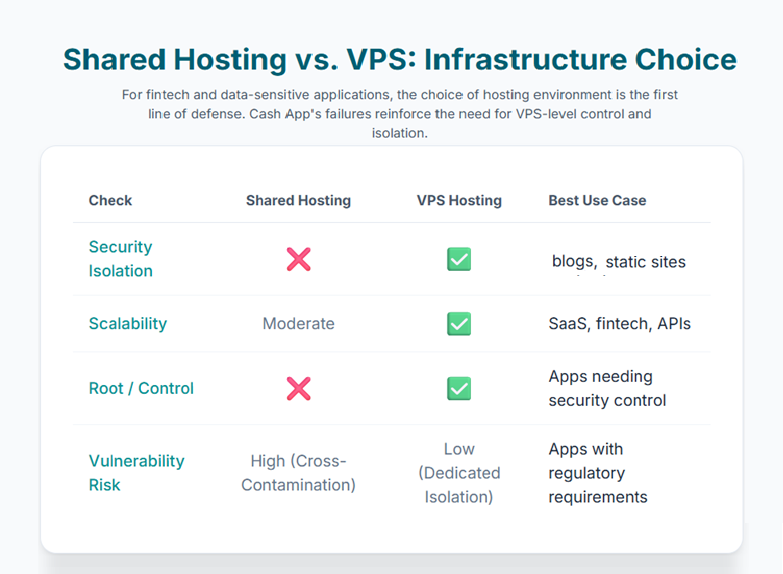
Why SkyNetHosting’s VPS Solutions Address These Critical Vulnerabilities
The Cash App lawsuits demonstrate that infrastructure choices have legal and financial consequences. When building applications that handle user data and financial transactions, the hosting environment becomes a critical component of your security strategy.
SkyNetHosting’s VPS solutions provide the infrastructure isolation and control that could have prevented Cash App’s costly mistakes:
- Complete virtual isolation protects your application from security incidents affecting other users
- Full root access enables implementation of custom security protocols and automated access management
- Dedicated resources ensure consistent performance for security systems and fraud detection
- Scalable architecture maintains security isolation as your application grows
- 24/7 monitoring and support provides the responsive customer service that prevents users from seeking fraudulent alternatives
The Cash App settlement should serve as a $202.5 million reminder that infrastructure security isn’t optional and it’s the foundation of user trust and business continuity. Every developer and CTO building the next generation of digital products must learn from Cash App’s expensive mistakes.
Don’t let weak infrastructure choices become your company’s next lawsuit. The cost of proper VPS hosting is negligible compared to the price of security failures and regulatory penalties.
Visit SkyNetHosting’s VPS solutions https://skynethosting.net/vps.htm to build your application on infrastructure designed to protect user data, maintain regulatory compliance, and scale securely from day one.
Frequently Asked Questions
Q: How much did Cash App pay in total settlements and fines?
A: Cash App’s parent company Block paid $202.5 million across three major actions: $15 million for data breach settlements, $12.5 million for spam text violations, and $175 million in CFPB fines for security protocol failures.
Q: What were the main security failures that led to Cash App’s lawsuits?
A: The primary failures included former employees retaining system access after termination, phone number recycling vulnerabilities allowing unauthorized account access, weak fraud investigation processes, and inadequate customer service infrastructure that enabled scammer impersonation.
Q: How does VPS hosting prevent the security issues Cash App experienced?
A: VPS hosting provides complete environment isolation, dedicated resources, root access for custom security controls, and the ability to implement automated access management systems that prevent the cross-contamination and access control failures that affected Cash App.
Q: Why is infrastructure isolation critical for fintech applications?
A: Financial applications handle sensitive user data and face strict regulatory requirements. Infrastructure isolation ensures that security breaches cannot spread between applications, provides the control needed for compliance implementation, and maintains consistent performance for security systems.
